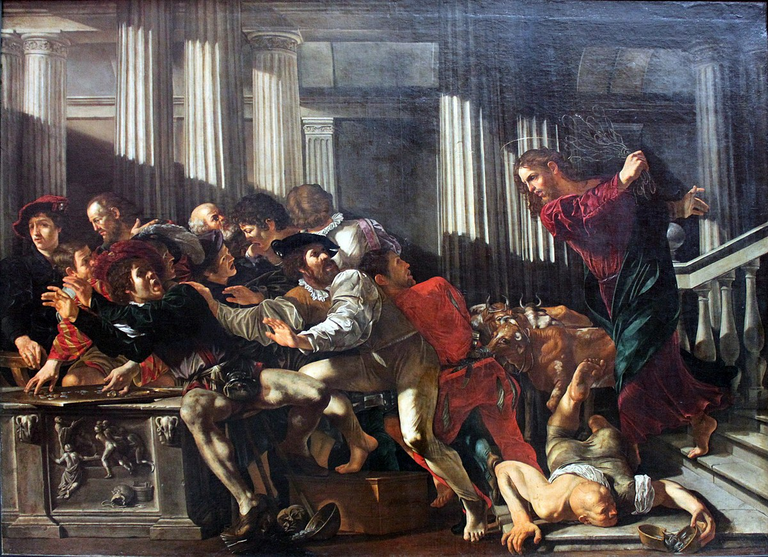He Died For Our Debts, Not Our Sins

Jesus driving money lenders from the temple (Cecco del Caravaggio, 1610)
Professor Michael Hudson has a very interesting view of Christianity in that he claims that the central preoccupation of Christianity was originally not sin but debt. In many languages, the word for sin is exactly the same as the word for debt. For example, in German the word Schuld means both debt and guilt (sin).
I have always considered the idea of suffering a punishment for other people's crimes to be completely preposterous and devoid of any logic whatsoever. But paying someone's debt for him or her makes perfect sense.
In civilizations across time and space, debt relief has been a way to deal with excessive debt obligations. In Sumer and Babylonia, new rulers would proclaim clean slate (accounting was done using clay slates) upon ascension to power, that is, relieve all debts. That would mean the end of literal debt slavery to those who were unable to pay. Debt slaves couldn't be recruited to the military.
Jesus of Nazareth campaigned for sins (debts) to be cancelled which put him at odds with the Pharisees. The temple was where banking was done in the ancient world. Priests were issuers of loans and you could deposit your gold at the temple. The Pharisees had the backing of creditors.
If Jesus of Nazareth were alive today, what do you think he would think about the cryptocurrency movement?
Source:
Here's an interesting article on the topic in Bitcoin Magazine:
https://news.bitcoin.com/would-jesus-use-bitcoin-against-the-money-changers/
Jesus never campaigned for debts to be forgiven. That's ludicrous. He's the way that sins are forgiven. If you repent of your sins and accept what he did on the cross as payment for your sins then your sins are forgiven and you're a child of God.
If sin is thought of as a violation against God's will (and not the bad act itself for which you have to apologize to the actual victim and no one else, logically speaking), then it is very strange that God didn't just forgive people for violating his commandments but that he had to arrange for himself to live as a human and get crucified to death for the crime of people acting against his will to be "paid for". What higher principle is being satisfied here by such arbitrary suffering? Is there a ledger somewhere that even God cannot tamper with that has to manipulated to get people off the hook for acting against a set of written commandments by the same God?
Nothing of it makes any sense. The entire story seems to me like an escape valve in a control system where clergymen preach of hellfire to stoke feelings of non-specific guilt in the population while retaining the only relief from that guilt.
Hi @markkujantunen!
Your post was upvoted by @steem-ua, new Steem dApp, using UserAuthority for algorithmic post curation!
Your UA account score is currently 4.093 which ranks you at #3618 across all Steem accounts.
Your rank has not changed in the last three days.
In our last Algorithmic Curation Round, consisting of 97 contributions, your post is ranked at #68.
Evaluation of your UA score:
Feel free to join our @steem-ua Discord server